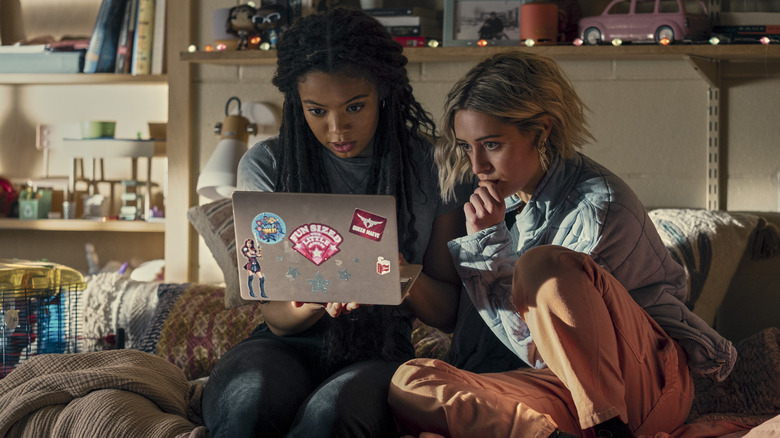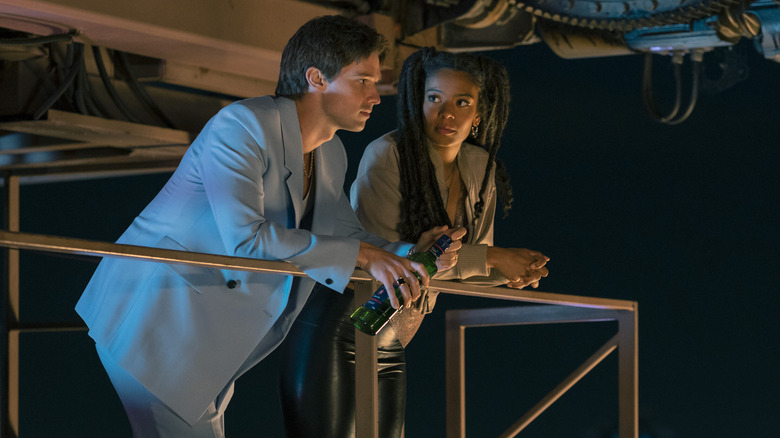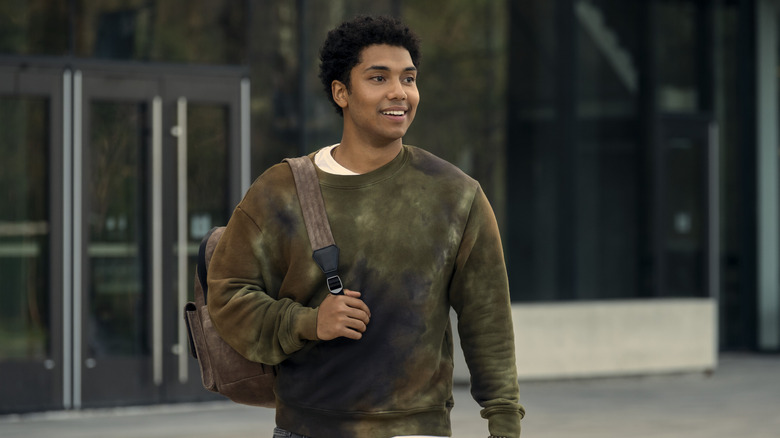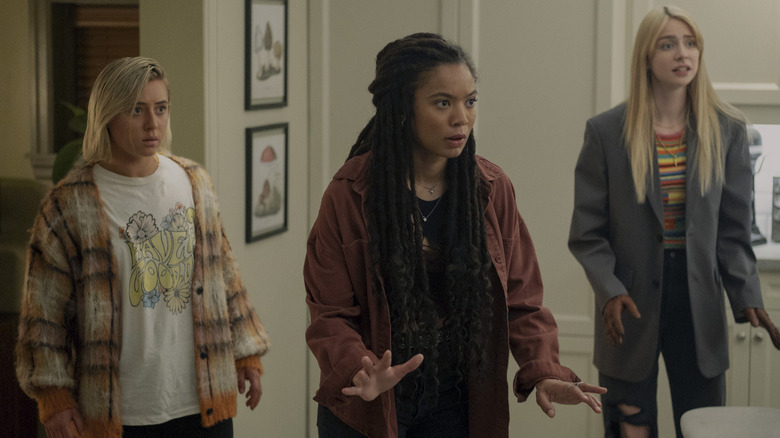Gen V Is As Brutal And Nasty As The Boys, But With One Key Difference
This article contains minor spoilers for "Gen V."
We're currently living through a superhero-obsessed era of entertainment, and while that's not necessarily a bad thing, it can often feel like we're all consumed by a monoculture. Fortunately, shows like "The Boys" exist to take the piss out of it all and use the mythos of supes to tell allegorical stories about our own lives, without glossing over all of the weird stuff. While everyone was making memes about Marvel's Ant-Man shrinking down small enough to enter Thanos' booty and explode him by resizing to prevent The Blip, "The Boys" had the hero, Termite, exploding through his boyfriend's dick while pleasuring him like a human sounding rod. While Lord Acton's theory that "absolute power corrupts absolutely" has often been applied to villains in comic books, "The Boys" showcases that assumed good guys like Homelander can and will take advantage of their superhero status in grotesque and nefarious ways.
"The Boys" is a graphic, hilarious, raunchy, inappropriate, and all-around fantastic superhero satire, that isn't afraid to take our most cursed "what if..." fan theories about what life would be like if superheroes really existed, and present them in all of their bloody, perverted glory. Every season of "The Boys" is wilder than the one that came before it, so it's no wonder it has become a smash hit, nabbed multiple Emmy nominations, and spawned multiple spin-offs. The latest is "Gen V," a series set that takes place at the prestigious Godolkin University School of Crimefighting, essentially a cross between Disney's "Sky High" and The Xavier School for Gifted Youngsters, but with the tenacity and audacity of "The Boys."
"Gen V" is just as brutal, nasty, and sexy as "The Boys," but is not only playing in the sandbox of superhero shows, it's also an unapologetic teen drama.
Coming of age and coming of rage
College is often pitched as the time when a person really figures out who they are, a milestone handful of years where you're no longer under the restrictions of childhood, but without the responsibilities of adulthood. Sure, it's sometimes filled with experimentation, out-of-control partying, and plenty of new adventures, but it's also incredibly difficult.
Young adulthood is also the time period when reality slaps us across the face harder than it ever has before, and we're still trying to figure out how to navigate our rushing hormones — but now we have unchaperoned dorm rooms. Add superpowers that you're still trying to make sense of to the mix, and you've got the heightened reality of college life in "Gen V."
"Gen V" follows freshman blood-bender Marie Morea (Jaz Sinclair), popular metal manipulator Andre Anderson (Chance Perdomo), freshman shrink-supe Emma Meyer (Lizze Broadway), mind empath Cate Dunlap (Maddie Phillips), powerful gender-shifter Jordan Li (Derek Luh, London Thor), and the school's star pupil, fire manipulator Luke "Golden Boy" Riordan (Patrick Schwarzenegger). Not only do they all have to contend with their star rankings as future heroes of major cities (or perhaps, even The Seven) and reckon with the fact some powers are viewed as more "valuable" than others, but they also still have to deal with garden variety "becoming an adult" drama.
Parents are still a pain in the ass and they don't have the ability to go no-contact, many of them are only a few years out of even realizing they had powers, teachers are a hassle, making friends is hard, and social media clout chasers are even worse when the world at large is obsessed with the world of supes. Honestly, in that regard, "Gen V" shares a lot of spiritual energy with the dystopian landscape of "The Hunger Games."
Gen V validates a maligned genre
There's an old belief that girls will watch so-called "boy's entertainment," with male leads and action-packed adventures, but boys won't watch shows marketed toward girls. There are always outliers (looking at you, "Barbie") but after seeing movies like "Captain Marvel" review-bombed simply for existing or how a phenomenal series like "Paper Girls" was kicked to the curb after only one season, it's hard not to accept that there's some depressing-ass truth in the statement.
Before I joined the illustrious ranks at /Film, I wrote a piece for What to Watch about how "taking potshots at 'Riverdale' won't make your bland faves any better," and that it's really disrespectful to treat "looks like a CW show" as shorthand for "bad." Before The CW was purchased and gutted into a shell of its former glory, it was the home of some of the best teen fare on television. "Gilmore Girls," "The Vampire Diaries, "Gossip Girl," "One Tree Hill," "Veronica Mars," "Blue Mountain State," and yes, "Riverdale" were all highly successful shows on the network, but the fact they were "for teens" has meant a lot of folks outside of the target demo have assumed that the shows were "bad" without ever watching a single frame of footage.
There are folks who have still not watched "Supernatural" because it aired on The CW, despite the fact the show was created by Eric Kripke ... THE SHOWRUNNER OF "THE BOYS." People have some biases against media about or marketed toward teen audiences, but since "The Boys" is so well-loved, the connection to "Gen V" helps validate a maligned genre of television, and will hopefully reel in viewers normally put off by a teen girl in the leading role.
As David Arquette so aptly says in "Never Been Kissed" about popularity, "All you need is the right person, one person to think you're cool and you're in." Well, "The Boys" is that one person for "Gen V."
Hell is a teenage girl
I've joked before that I've referenced the "Hell is a teenage girl" line from Karyn Kusama's "Jennifer's Body" in my work more than any other movie quote, and I'm going to do it again with "Gen V." I love "The Boys" quite dearly, and I am captivated by Annie "Starlight" January, Margaret "Queen Maeve" Shaw, and even baddies like Vought International president Ashley Barrett and Klara "Stormfront" Risinger, but "The Boys" has always felt like a show geared toward ... well, boys. This isn't a bad thing by any means and I certainly don't need entertainment to relate to me on a personal level to enjoy it, but is merely a fact presented with neutral value.
Kimiko Miyashiro is even nicknamed "the Female" because she's the token girl of the group. I have a great affinity for the "girl on the sports team" characters as seen in just about every '90s sports movie made in the '90s (Julie "The Cat" Gaffney 4ever), but I'm always going to be doubly excited when a young woman gets to be the protagonist. Both "The Boys" and "Gen V" are ensemble shows, but just as "The Boys" is Hughie Campbell's story above all else, "Gen V" is Marie Moreau's show.
Marie's struggles are similar to those of her fellow supes, but they're also unquestionably related to her womanhood. She navigates the world of superherodom differently than Luke or Andre, and her traumatic backstory is related to a coming-of-age experience that is terrifying enough on its own without throwing in "uncontrollable blood-bending powers" into the mix. "The Boys" has done a phenomenal job at exploring how all that glitters is not gold for supes, but "Gen V" takes it a step further by dissecting how superpowers impact supes during one of the most vulnerable and confusing times of their lives.
"Gen V" is available to stream on Prime Video, with new episodes arriving on Fridays.



